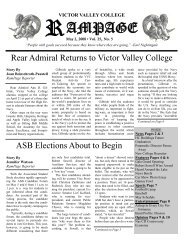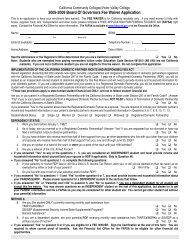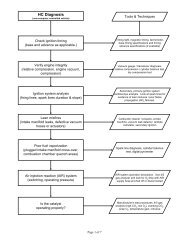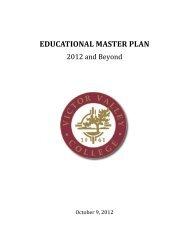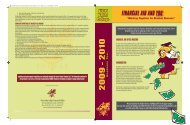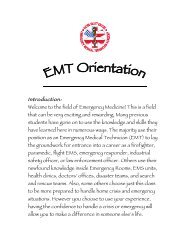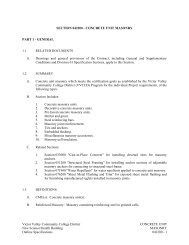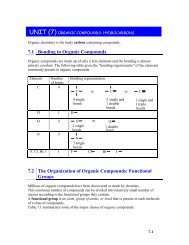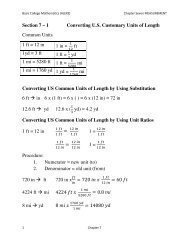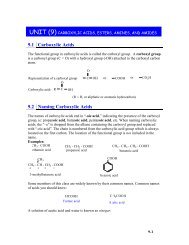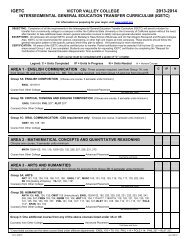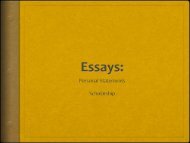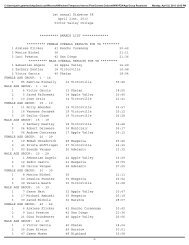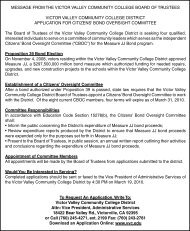Download - Victor Valley College
Download - Victor Valley College
Download - Victor Valley College
You also want an ePaper? Increase the reach of your titles
YUMPU automatically turns print PDFs into web optimized ePapers that Google loves.
PROGRAMS / COURSE DESCRIPTION<br />
Students will also learn the basics of noninvasive<br />
treatments for certain sleep disorders.<br />
RSPT 90 ECHOCARDIOGRAPHY 1<br />
Units: 10.0 - 64-72 hours lecture and 288-324 hours<br />
laboratory. (No prerequisite. Recommended<br />
preparation: BIOL 211, BIOL 231 and MATH 90.)<br />
This course is designed to prepare students for an entry<br />
level career in a hospital or clinic as an<br />
echocardiographer. Topics include physics,<br />
instrumentation, cardiac anatomy and physiology,<br />
cardiac disease specific calculations, standard exam<br />
calculations and protocol.<br />
RSPT 91 ECHOCARDIOGRAPHY 2<br />
Units: 10.0 - 64-72 hours lecture and 288-324 hours<br />
laboratory. (No prerequisite. Recommended<br />
preparation: RSPT 90.)<br />
This course expands on echocardiography subjects<br />
presented in RSPT 90. Topics include assessment of<br />
pericardial diseases, vascular disorders,<br />
electrocardiogram (ECG) and advanced topics.<br />
RSPT 138 COOPERATIVE EDUCATION<br />
See Cooperative Education listing (1-8 units). CSU<br />
RSPT 149 INDEPENDENT STUDY<br />
See Independent Study listing (1-3 units)<br />
RSPT 230 INTRODUCTION TO RESPIRATORY<br />
THERAPY<br />
Units: 3.0 - 48-54 hours lecture. CSU. (Prerequisite:<br />
MATH 50, CHEM 100 or CHEM H100, BIOL 100 or<br />
BIOL H100, BIOL 107 or BIOL H107 and formal<br />
admission to the Respiratory Therapy Program)<br />
Introduces the student to respiratory therapy as a health<br />
science profession, including history, professional<br />
requirements, responsibilities, professional<br />
organizations, and credentialing of the respiratory care<br />
practitioner. Provides basic anatomy and physiology,<br />
physics and math, and basic cardio-pulmonary<br />
pathology in order to give the student a foundation of<br />
theory and application.<br />
RSPT 231 ORIENTATION TO THE BASIC<br />
FUNDAMENTALS OF RESPIRATORY THERAPY<br />
Units: 10.0 - 64-72 hours lecture and 324 hours<br />
laboratory. CSU. (Prerequisite: RSPT 230 with a grade<br />
of “C” or better.)<br />
This course continues with a more advanced discussion<br />
of medical terminology, anatomy, physiology and<br />
cardiopulmonary pathology as it relates to the clinical<br />
applications of medial gas therapy, humidity and aerosol<br />
therapy, therapeutic and diagnostic modalities, and<br />
infection control. Students will be provided with an<br />
extensive orientation to the hospital environment and<br />
the administration of basic respiratory therapy to<br />
patients.<br />
RSPT 232 PATIENT ASSESSMENT AND CLINICAL<br />
APPLICATION OF RESPIRATORY THERAPY<br />
Units: 10.0 - 64-72 hours lecture and 288-324 hours<br />
clinical. CSU. (Prerequisite: RSPT 231 with a grade of<br />
“C” or better)<br />
This course is a more in-depth study of the theory and<br />
application of respiratory therapy. Its content includes<br />
airway management, pulmonary assessment, advanced<br />
cardiopulmonary physiology and the pharmacology<br />
associated with pulmonary patients. The student will<br />
spend 16 hours a week in the hospital administrating<br />
respiratory modalities to patients.<br />
RSPT 233 INTENSIVE RESPIRATORY CARE AND<br />
ADVANCED PULMONARY PHYSIOLOGY<br />
Units: 13.0 - 64-72 hours lecture and 54 hours<br />
laboratory plus 432 hours clinical. CSU. (Prerequisite:<br />
RSPT 239, BIOL 211, BIOL 231, with a grade of “C” or<br />
better.)<br />
A more advanced study of the theory and application of<br />
respiratory care. The content will include: mechanical<br />
life support, respiratory physiology, equipment utilized in<br />
the critical care unit, microbiology, arterial puncture and<br />
analysis, endo-tracheal intubation, and principles of<br />
advanced cardiac life support.<br />
RSPT 234 NEONATAL AND PEDIATRIC<br />
RESPIRATORY CARE AND RELATED<br />
PATHOPHYSIOLOGY<br />
Units: 13.0 - 64-72 hours lecture. 48-54 hours laboratory<br />
and 384-432 hours clinical CSU. (Prerequisite: RSPT<br />
233 and BIOL 221 with a grade of “C” or better)<br />
This course is a more advanced study of the theory and<br />
application of neonatal/pediatric respiratory care. The<br />
content will include: mechanical life support, respiratory<br />
pathophysiology, equipment utilized in the NICU/PICU,<br />
microbiology, umbilical line, capillary blood samples and<br />
analysis, endotracheal intubation, and principles of<br />
PALS and NRP.<br />
RSPT 239 INTRODUCTION TO CONTINUOUS<br />
MECHANICAL VENTILATORY SUPPORT<br />
Units: 2.0 - 16-18 hours lecture and 48-54 hours<br />
laboratory. (Prerequisite: Completion of RSPT 232 with<br />
a “C” or better)<br />
This course introduces the principles of mechanical<br />
ventilation, allows hands-on experience with current<br />
ventilators, and reinforces therapeutic care.<br />
RESPIRATORY THERAPY<br />
2012-2013 <strong>Victor</strong> <strong>Valley</strong> <strong>College</strong> Catalog 299



